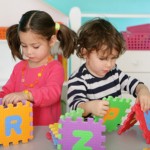 Collaboration is something generally seen as a positive behaviour for organisations and employees to adopt. Indeed, the desire to see employees generally being helpful and supportive of one another has seen books such as Give and Take by Adam Grant hit the bestseller lists.
Collaboration is something generally seen as a positive behaviour for organisations and employees to adopt. Indeed, the desire to see employees generally being helpful and supportive of one another has seen books such as Give and Take by Adam Grant hit the bestseller lists.
Actually achieving such a culture is typically easier said than done however. New research suggests there may be lessons we can take from how sharing can be encouraged amongst children.
The study was looking in particular at the conditions surrounding sharing toys between 3 and 4 year old children. Sharing toys is seen as a generally positive thing for children to do, just as sharing knowledge is generally seen as a positive thing for adults to do.
Alas, the research showed that parents, just as managers, can often go about encouraging these sharing behaviours in completely counter productive ways.
The research found that when children were told to share, or even bribed with sweets to do so, it led to less sharing than was otherwise the case. The kids were unconsciously deciding that when they were told to do something, it must be something that they wouldn’t ordinarily do willingly. So telling kids to share in actual fact reinforced an image in their own minds that they’re not naturally sharing people.
However, if children are given the choice to share or not share, then those who share will come to believe they are ‘sharing people’. It’s the age old theory that we figure out the kind of person we are by noticing the kind of behaviours we undertake.
So if you do a good deed one day, it reinforces your notion that you’re the kind of person that thinks of others and regularly does good deeds. It becomes a self-fulfilling prophecy.
And so it is for children: if they notice that they share without being coerced or bribed, then they are more likely to decide that they are the kind of people who share.
“You might imagine that making difficult, costly choices is taxing for young children or even that once children share, they don’t feel the need to do so again. But this wasn’t the case: Once children made a difficult decision to give up something for someone else, they were more generous, not less, later on.” said the researcher.
It’s all a bit like the Pygmalion Effect that I wrote about recently, whereby employees were found to exhibit the kind of behaviours their managers hoped they would, purely because their managers believed they already did.
Lead researcher Brian McNatt concluded his study by suggesting managers “recognise the possible power and influence in a) having a genuine interest and belief in the potential of their employees… and b) engaging in actions that support others and communicate that belief… increasing others’ motivation and effort and helping them to achieve that potential”.
So maybe it’s time we stop trying to force or coerce collaborative behaviour from employees and instead simply appreciate that they are quite probably collaborative already. We just need to give them the environment that will encourage that.
Hmm, I wonder how gamification fits in with this? Isn't that trying to 'bribe' particular behaviours?